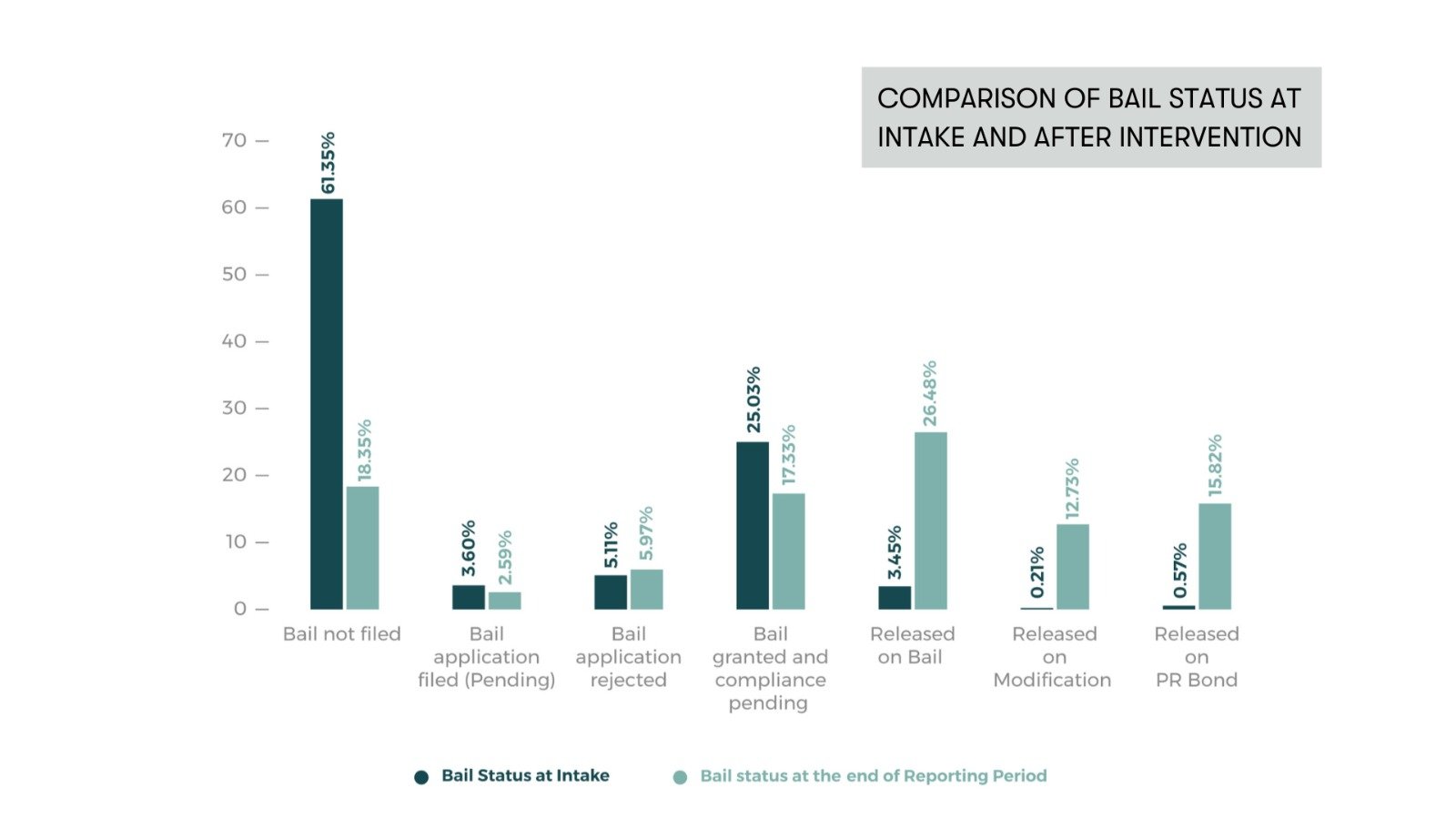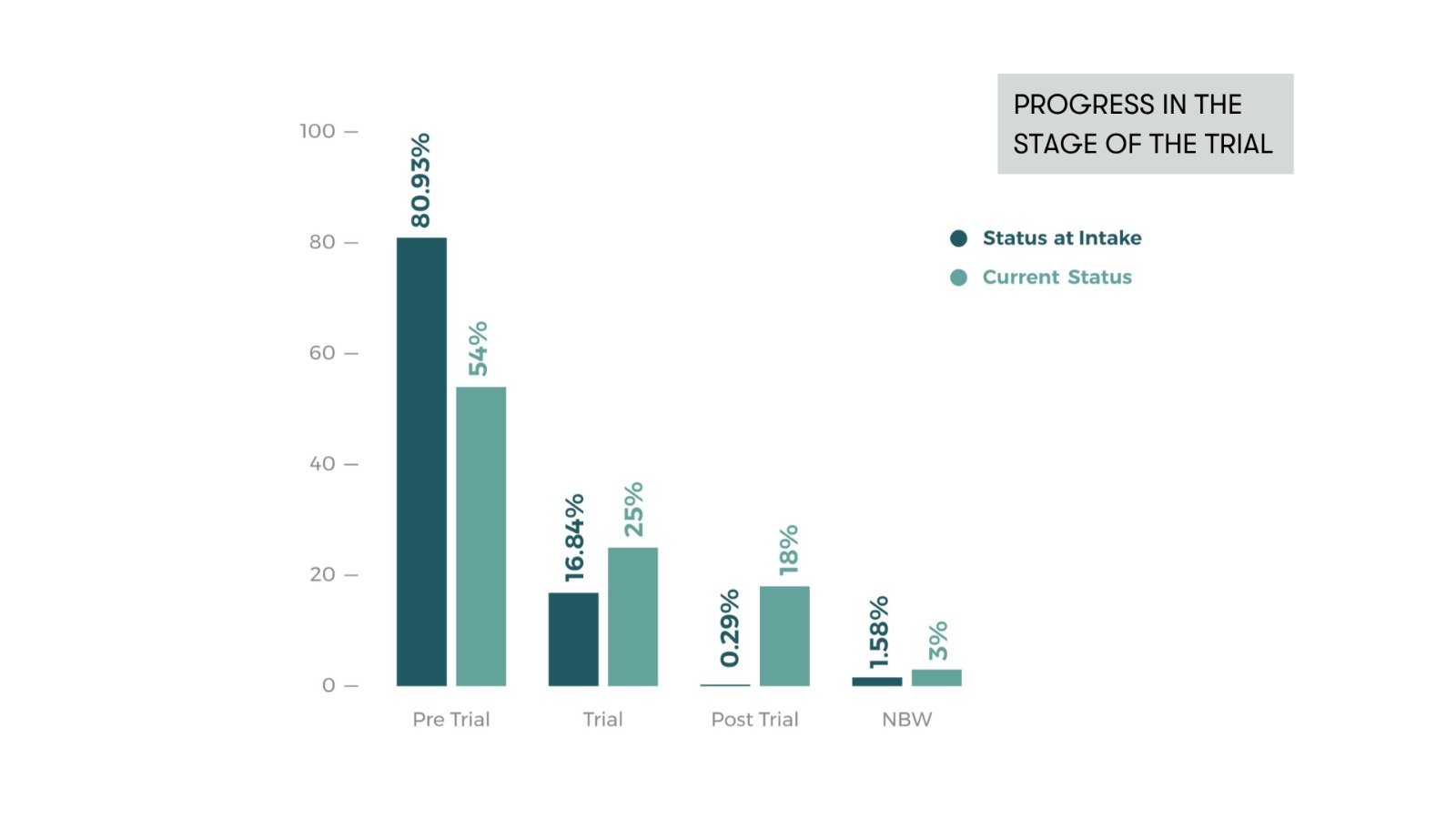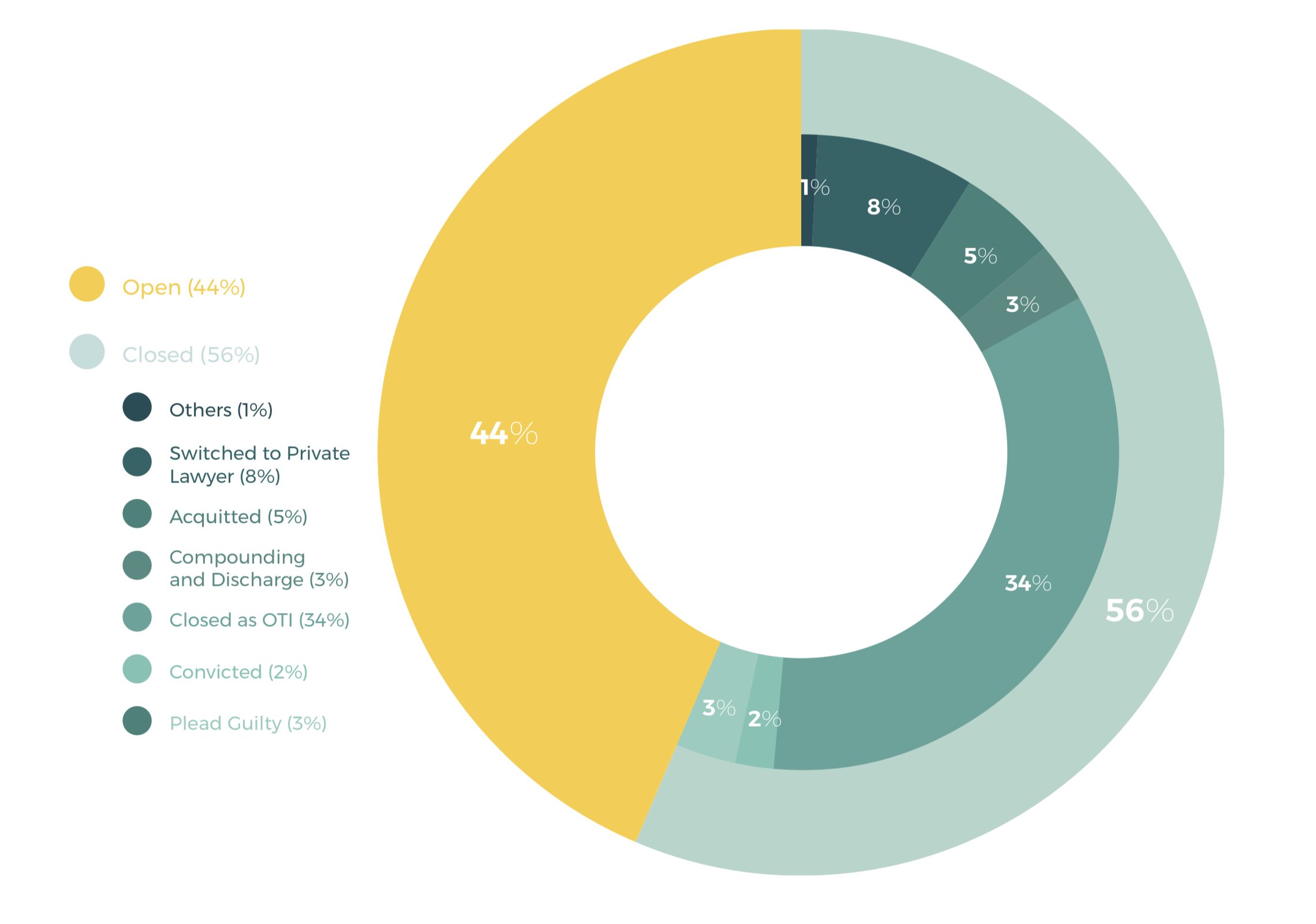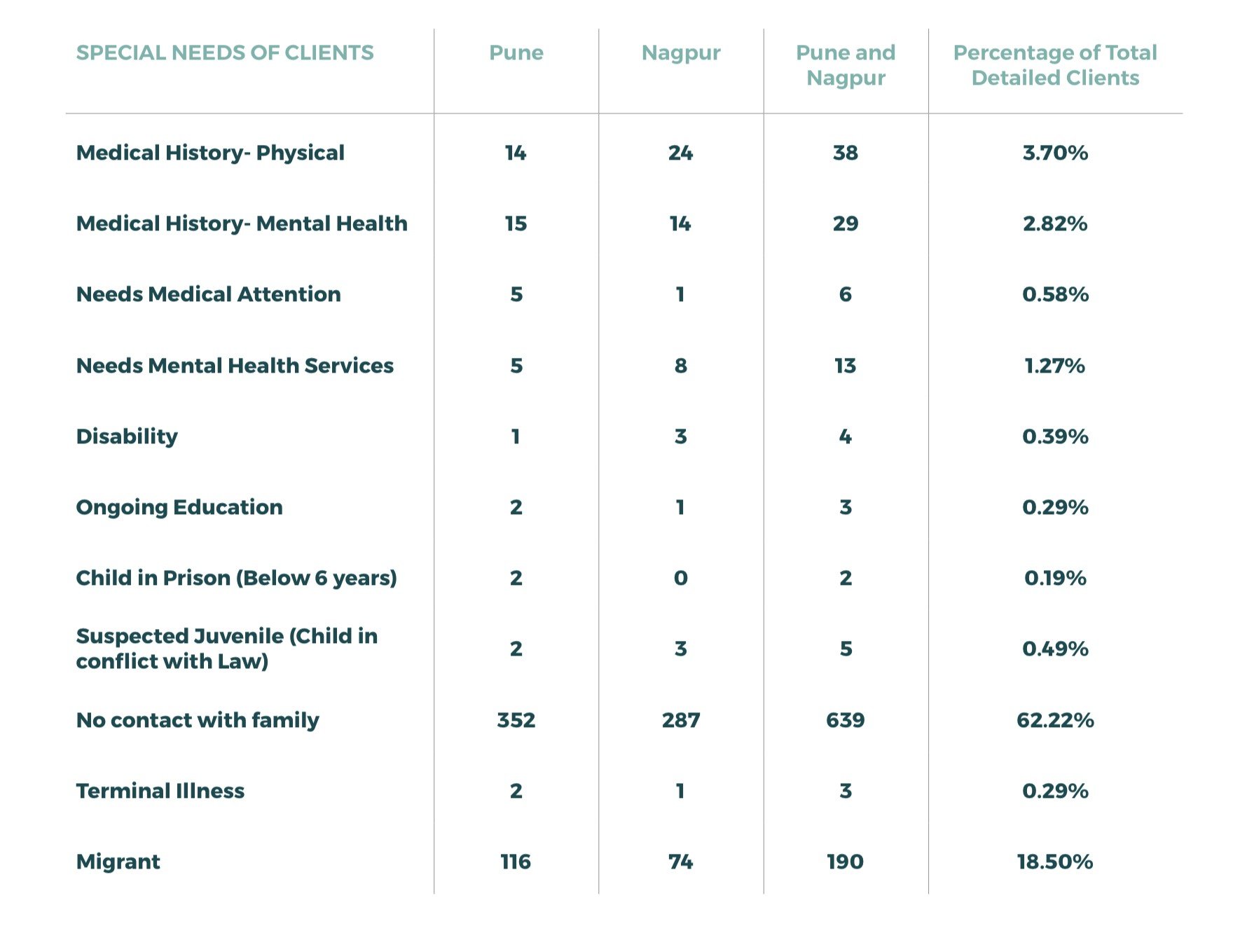The Fair Trial Fellowship Programme is an initiative instituted by the National Law University under Project 39A for providing legal representation to undertrial prisoners in Pune (Yerwada) and Nagpur Central Prisons. The Programme seeks to strengthen existing mechanisms of state-sponsored legal aid service delivery and support advocates empaneled with the District Legal Services Authorities and Taluka Legal Services Committee(LSAs) in their efforts to provide quality legal representation to undertrial prisoners.
This report presents the learnings and reflections of the Programme from its work during January 2019 to March 2021. The analysis presented aims to demonstrate empirically verifiable trends which have emerged from the Programme and reflect on them to draw lessons for improving legal aid service delivery through the LSAs.
Access the executive summary here.
Access the full report here.
Intervention model:
Social work fellows(SWFs) visit prison barracks to identify undertrial prisoners in need of legal representation and provide them preliminary information on their case and legal procedure. Fellows ascertain case details for the undertrial prisoners seeking legal representation and facilitate the process of allocation of Panel Advocate through the LSAs.
Upon allocation of Panel Advocates, Legal fellows(LFs) assist them in both pre-trial (bail and remand) and trial procedures. The assistance provided is in the nature of assisting in drafting and filing of bail and other applications, providing research briefs on point of law, assisting during court hearings, coordinating with prison authorities for implementation of court orders or release of inmates, meeting with inmates in prison to seek instructions, liaising with family to obtain necessary documents etc.
In the meantime, SWFs continue to provide regular updates to clients in prison on progress of their case, undertake home visits, build linkages with their family and where required, refer them to other organizations for services like bail sponsorship, mental health facilities, livelihood training, post release shelter etc.
Work and Outcome:
The Programme reached out to over 2300 undertrial prisoners in Pune and Nagpur. 1390 of the cases were detailed interventions, where the fellows were actively involved in the pre-trial and trial process. Of the 749 bail applications filed, 618 were allowed and the efforts of the fellows facilitated the release of 501 inmates. In addition, trials were completed in 300 cases and 131 prisoners were released through acquittal, discharge and compounding.
What worked well :
Active Presence of SWFs: SWFs routine visit to prison ensured clients had an accessible interface of the LSA within the barracks. This facilitated easy access to updates/information on their cases and provided them much needed assurance of regular follow-ups in court, establishing the Programme’s credibility amongst clients.
Accountability to the clients and their families: Interventions under the Programme were client- centric, aimed at ensuring that FTF clients and their families understand the developments and do not feel alienated in the process. The case work process focused on understanding the clients’ needs and determined strategies based on their informed choice.
Acceptance among Panel Advocates and prisons: Prison authorities have acknowledged the role of the Programme and the Fellows towards securing rights of the undertrial prisoners and view the Fellows as an extension of the LSA framework in doing so.Over time, the panel advocates also recognised the contribution of the Fellows and became more willing to work with the Programme. In 81.35% of the cases, Panel Advocates actively received Fellows’ assistance.
Customised bail applications: Regular interaction with undertrial prisoners has resulted in better framing of bail/ modification applications which include greater detail on facts of the case and clients’ personal circumstances. This has resulted in better bail outcomes overall as compared to the practice of filing proforma bail applications
Constant engagement with judiciary resulted in successful modification applications: In its endeavour to secure releases for the clients, Fellows have used legal research to constantly cite case laws on lesser followed principles on bail modification and release, which has led to 85% modifications being granted out of the 258 applications filed. In addition to this, working with family members, employers, community members and bail sponsorship organisations demonstrably increased the probability of compliance.
Reflections and Challenges:
A need for legal aid was felt amongst the undertrial prisoners as the Programme received a high number of applications (2100) from the very outset seeking legal representation through the LSAs at the time of intake. In 44% of the cases received, the clients had no lawyer at the time of case intake. Interactions with clients at the stage of intake also revealed a significant number of clients being out of touch with lawyers who represented them at the stage of first production in courts. 35% of the clients who approached the Programme had a private lawyer at the stage of intake but sought appointment of a Panel Advocate for their case.
The demographic profile of FTF clients reflects multiple socio-economic vulnerabilities and links to their limitations in navigating through the criminal justice system. In addition, 42.55% of clients had at least one special need in the nature of medical history (both physical and mental health); disability; ongoing education; child in prison (below 6 years); suspected juvenility; no contact with family; terminal illness and migrant. It is therefore of utmost importance that the legal aid delivery mechanism imagines support services through professional social workers and mental health professionals as an essential element to ensure quality legal representation.
The Programme’s experiences reflect that it is a labour and resource intensive initiative which is susceptible to the same slippages as state-sponsored legal aid without regular supervision and monitoring. This is a major learning towards proposing a systemic reform of legal aid. For a more robust and sustainable legal aid system, there should be dedicated lawyers working exclusively to provide legal aid to criminal defendants, similar to the recently implemented Legal Aid Defence Counsel System. The Programme’s learnings also make it imperative that the setup of the LADC office should not only have dedicated lawyers but also trained social workers who respond to the special needs of the clients, follow-up and be the bridge between the client and the system.











